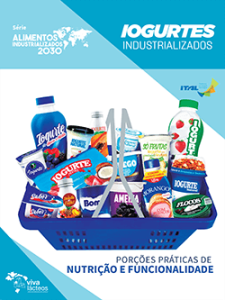NUTRITIONAL VALUE OF INDUSTRIALIZED YOGURTS
Many scientific researches confirm the yogurt nutritional value as a good source of proteins, calcium, probiotics and other nutrients. Some studies still observed that people who consume yogurts tent to have healthy food habits. There is a wide variety of industrialized yogurts, with differences in the content of ingredients stated in the product label. However, in the analysis of the sample of 150 industrialized yogurts marketed in Brazil (data collected in November, 2019) it is possible to depict its relevant value for feeding and nutrition, differently from the false statements that these products are not nutritive and also poorly healthy as they have additives.
Generally, yogurts contain relevant quantities of proteins and calcium and, at the same time, with low contents of calories, sodium and saturated fats. There are natural unsweetened skimmed yogurts, which have less calories, and even the more caloric, usually due to addition of sugar and fat, according to the specific legislation.
PROTEINS
Even with existing variations among the 150 analyzed products, the PROTEIN content in industrialized yogurts is quire relevant for the consumers feeding and nutrition. This fact is demonstrated by the data analyzed about the content of protein, both in individual packages (portions varying within 90 to 300 g) as in quantities of each 100 g of product.
CALCIUM
The content of CALCIUM in industrialized yogurt is one of its main nutritional attributes. Most of the products provide very significant quantities to compose the recommended needs for daily consumption of 1,000 mg of calcium.
CARBOHYDRATES
The nutritional tables of the 150 industrialized yogurts demonstrated that mos products do not exceed 10% of the recommended daily needs of 300 g of carbohydrates. It is important to note that, in the total of carbohydrates present in the yogurts, there is a percentage of lactose, disaccharides naturally present in the milk.
CALORIES (ENERGY VALUE)
Generally, yogurts are not considered as products of low caloric content, considering the average caloric value (116 Kcal) of individual portions. The portions size vary significantly among the analyzed products: 42 items in the range of 90 g to 100 g; 23 between 120 g to 140 g; 71 between 150 g to 170 g; 8 between 180 g to 200 g; and 6 between 250 g to 300 g. On the other hand, following the market trend, there is an increase in the offer of less caloric products, using skimmed milk, sugar reduction, use of sweeteners and reduction of the portions size.
SATURATED FAT
Most analyzed product can be considered as low content of SATURATED FAT and, even in the other products, the quantities of sodium are not so relevant based on the daily intake recommendations of 22 g. It is important to note that saturated fat is not a chemically homogeneous group and that the milk fat contains fatty acids, such as, for example, butyric acid, vaccenic acid, conjugated linoleic acid and alpha linoleic acid, which present benefits to the health.
SODIUM
Most analyzed product can be considered as low content of SODIUM and, even in the other products, the quantities of sodium are not so relevant based on the daily intake recommendations of 2,400 mg.




